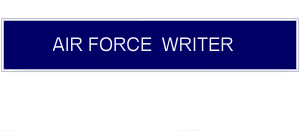Back to Air Force Achievement Medal
How to Write an Air Force Achievement Medal Citation
Write the citation. This is the text that will be read during the presentation of the award. It can only be 13 lines long including the opening and closing sentences. If the award is for a period of service (meritorious service), the EPRs written during that period are a good source for material.
General Instructions:
Prepare citations on 8-1/2 by 11 inch plain bond paper (landscape) or AF Form 2274.
Use Times New Roman 12 point font.
Use the mandatory opening and closing sentences listed below.
Final text must be perfect with no corrections.
Citations must capture the substance of the decoration with dignity and clarity.
The narrative is a short description of the act, achievement, or service. Be specific on facts and limit to no more than two sentences, if possible. Emphasize the individual's mission contribution and use active voice and forceful verbs.
The use of common exercise or code names is acceptable in citations (Roving Sands, etc.). Do not use any abbreviations other than Jr., Sr., II, etc. Do not use symbols (the exception is the dollar sign) and do not use abbreviations. Even common abbreviations should be spelled out (USAF, DoD, AFB, etc).
Do not use zeros in front of single-digit dates (ex. 1 Jan 06).
For compound grade titles, such as First Lieutenant and Staff Sergeant, spell out the complete grade title in the opening sentence and then use the short title (Lieutenant, Sergeant, etc) in the remainder of the citation.
Do not separate the rank from the name. They should be always listed together.
Opening Sentence
To recognize meritorious service
The Air Force refers to "exemplary service over an extended period of time" as meritorious service. The following opening sentence is appropriate for medals awarded at the end of an assignment.
Senior Airman Dick W. Taylor distinguished himself by meritorious service as (duty assignment, and office location) OR while assigned to (office location).
To recognize outstanding achievement
An example of outstanding achievement would be the successful completion of an important project or operation of significant duration (weeks or months). Use the following sentence:
Senior Airman Dick W. Taylor distinguished himself by outstanding achievement, as (duty assignment, and office location) OR while assigned to (office location).
To recognize a single act or achievement
For brief periods of service or single acts, use the following opening sentence:
Senior Airman Dick W. Taylor distinguished himself by outstanding achievement (at or near).
Narrative Description (Achievement or Service)
Airman Taylorís outstanding professional skill, knowledge, and leadership aided immeasurably in... This is where you enter two or three sentences describing the accomplishment such as "establishing the first successful ship-to-shore communications method using the Air Force's newest satellite system. His dedicated efforts resulted in an increased data transfer capacity and provided a flexibility that ensured 100% mission success rate in the Atlantic Command Area of Responsibility."
Closing Sentence
Confine the closing to one sentence which will personalize the summation. Although the AFI calls for a personalized closing sentence, the closing sentence most commonly used is the same one used with the Air Force Commendation Medal:
"The distinctive accomplishments of Airman Taylor reflect credit upon himself and the United States Air Force."
Other acceptable examples of personalized closing sentences are:
"His initiative saved the Air Force over $29,000 and enhanced combat readiness for special operations."
"The dedication and enthusiasm exhibited by A1C Lewis were key to the success of the operation and a credit to his squadron and himself."
